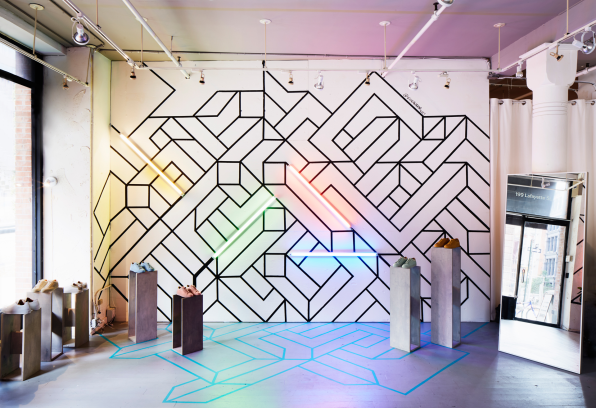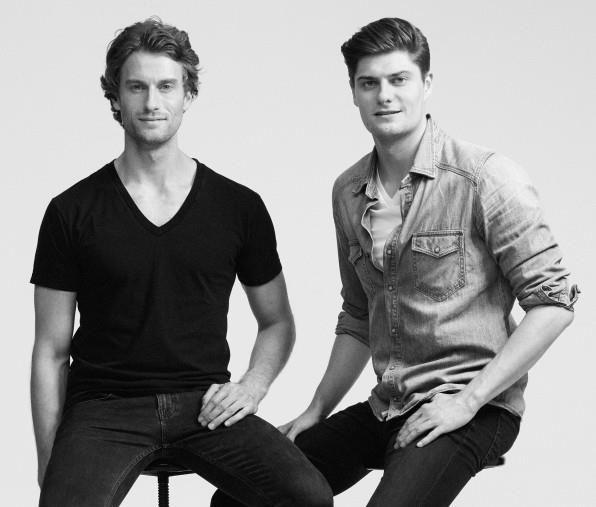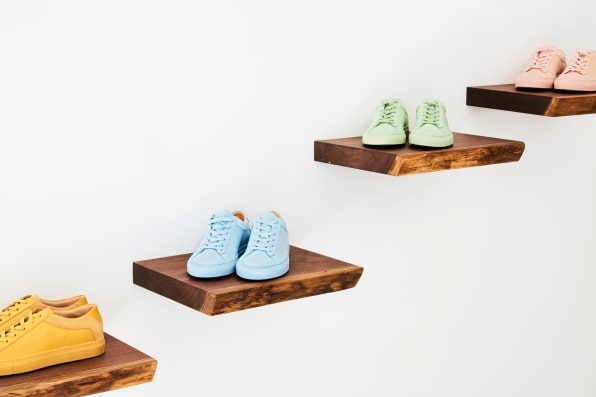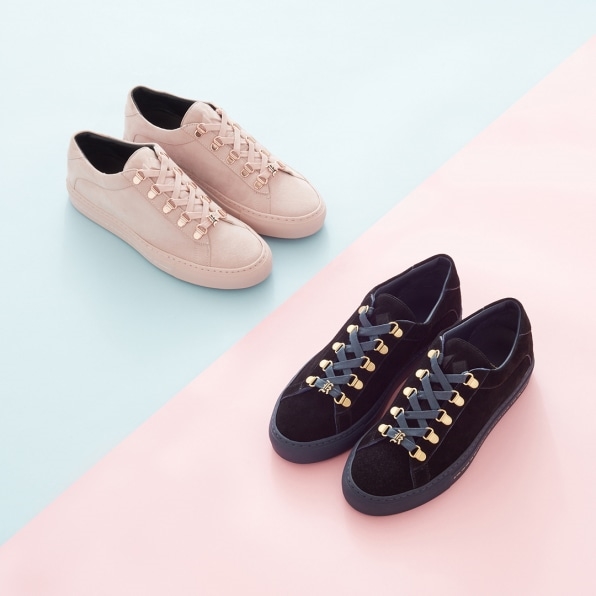A year ago, in perhaps the weirdest bundled deal of all time, sneaker brand Koio gave customers the chance to get a tattoo plus a pair of calf-suede kicks for $500. Given that the tattoo artist, JonBoy, charged at least $300 for a small design and the sneakers cost $298, this was a steal.
Koio’s founders Chris Wichert and Johannes Quodt were expecting a few dozen tattoo-crazed people to show up for the New York City event. But hours before their Nolita store opened at 10 a.m., hundreds of people snaked around the block. “We were shocked by how many people were into it,” Wichert says. “You couldn’t even choose what tattoo you wanted. You had to pick from a selection of 20 options that JonBoy had provided.”

The event was a sign that their brand was making a mark in the very niche market they were going for: edgy, urban, and fashion-forward millennials. These are exactly the people who might consider dropping $800 on Chanel high tops or $695 sneaker loafer hybrids from Prada.
Wichert and Quodt realized that these designer brands marked up their shoes two or three times, partly because the high price made the products appear more exclusive, and partly because they had massive overheads, with glittery brick-and-mortar stores to run and massive ad campaigns in glossy magazines.
The pair believed they could make the same shoes at a fraction of the price by selling them directly to the consumer, without all the expensive marketing budget of the luxury brands. With Koio, their goal was to find customers who would appreciate well-designed and well-crafted sneakers and offer them at prices much less than they were used to paying, with low-tops starting at $148 and high-tops starting at $298.
Wichert and Quodt grew up in Germany, where luxury sneakers took off in the ’90s, decades before they became popular in the U.S. While American sneaker heads were going wild for the latest Air Jordans, Wichert and Quodt—European sneaker enthusiasts—had a slightly more refined sensibility. They were obsessed with high-end designers whose shoes were Italian-made with the best possible materials, like calf hair and lambskin. Wichert remembers saving up for his first pair of Prada kicks when he was still a teenager. “I waited in line for them,” he says. “But when I brought them home, I had to think carefully about when, exactly, I would actually wear them, because they were so expensive I didn’t want to get them scuffed.”
These were the kinds of memories that Wichert and Quodt exchanged when they both started their MBAs at the Wharton School of Business at the University of Pennsylvania. “As tall German guys, we really stood out,” says Quodt. “We bonded over our mutual love of sneakers and the fact that we wished there were more affordable high-quality sneakers on the market.”

At Wharton, Wichert and Quodt were immersed in case studies by the school’s alumni, including the founders of Warby Parker and Bonobos, who have changed the way we shop for glasses and menswear by selling products direct to consumers. They had also observed that American consumers were only just beginning to show an interest in the sleek leather sneakers they had grown up with, turning luxury kicks into a powerful global trend. In 2015, high-end sneakers were a $3.4 billion market and, according to analysts, demand appears to be growing with brands like Celine, Jimmy Choo, and Christian Louboutin making their own versions. “It’s partly because consumers are increasingly more casual in their dress,” Quodt says. “Since they are spending so much time in streetwear, they want their casual gear to be just as stylish and well-made.”
They figured there might be a market for high-end sneakers that were less expensive than those offered by Balenciaga, Gucci, Chanel, and Prada So, in 2014, during their second year of the Wharton program, they decided to launch a new brand, Koio, in which they would sell luxury sneakers through their own website and stores, thereby eliminating middleman markups.

While they were still students, the pair went on an adventure in Italy to find the artisanal factories where their favorite designers manufactured sneakers. They believed that high-quality materials and craftsmanship not only made the shoes look better, but also ensured they would be comfortable for everyday wear. “We got off the flight and mentioned our business idea to a random guy we met who responded with, ‘My uncle has a factory that makes sneakers! You should talk to him!’” Wichert recalls. “It turns out that his uncle didn’t make exactly the kind of sneakers we wanted, but it just shows how business works in Italy.”
They discovered that many businesses in the country continue to be run by families, rather than corporations. It turned out that the best way to find the kind of factory they were looking for was to build relationships with the owner of one family-run workshop, who would then introduce them to three others.
They did run into hurdles, though. They discovered that while many high-end brands still work with highly skilled craftspeople, there are also many factories that create shoddy products for brands that just want the “Made in Italy” stamp on it. “We were surprised by this,” Wichert says.
“There were tons of factories that were really making their products cheaply in China, but because they were finished in Italy, they still carried the Italian-made label.”
Eventually, after months of searching, they found a workshop in Le Marche, a region in Northeastern Italy known for shoe making, that made sneakers for Balenciaga and Chanel. They decided to make their first batch of sneakers there. They developed their aesthetic, which consists of simple streamlined monochromatic low tops and high tops in a wide range of colors.
Eventually, Chanel decided to buy the factory from the Italian family that owned it, so it could better control the quality of its supply chain. But since the facility had more capacity than it needed to serve its own clients, Chanel invites other brands to make their products there. This has effectively made Koio Chanel’s customer.

To launch the sneaker company in a crowded fashion market, Wichert and Quodts needed the support of seasoned e-commerce experts. The same year they launched, two other startups–Greats and M.Gemi–launched with a similar mission of creating high-end, Italian-made sneakers at a lower price.
Wharton, it turned out, was a great place to start building this network. They managed to bring on alumni Andy Dunn, cofounder of Bonobos, and Neil Blumenthal, cofounder of Warby Parker, as investors and advisers. And these well-connected founders introduced them to people like designer Steven Alan, Trunk Club founder Brian Spaly, and the Winklevoss brothers, who all invested in the company’s $2.3 million seed round. “A lot of people say you shouldn’t go to business school if you want to launch a startup,” Quodts says. “We have the opposite experience. As foreigners, we really needed these connections to get off the ground.”
Wichert and Quodt began to work on Koio full time after they graduated in May 2015, and since then, the brand has blown up. In 2017, it grew 400% over 2016, the founders say, and they are now selling more than 1,000 pairs of sneakers every month. While many brick and mortar stores are shuttering, Koio has opened two stores in New York. Their first pop-up in Soho has been profitable since it opened, so they just signed a five-year lease on the space.
These days, Koio’s founders are trying to establish themselves among the stylish streetwear crowd, which is why collaborations like the one with JonBoy are so important. It appears to be working. Their top-selling colors for both men and women are a blush pink and a mustard yellow, colors that definitely stand out. As the website description says, the shoes come “with a sprinkle of zero f***s given.”
But they are also trying to capture new consumers who may have never considered buying luxury sneakers before, but might be convinced to do so, especially with a slightly more affordable price point than the designer brands.
Koio is constantly partnering with artists and brands to get the word out. It has recently created special collections with ballerina James Whiteside, The Beverly Hills Hotel, Game of Thrones, and The Flower Shop.
“We think the luxury sneaker market is only just heating up,” Wichert says. “At this point, we just need to keep up with demand.”
Fortunately, he’s wearing a pair of comfortable sneakers, so he won’t get blisters along the way.
Fast Company , Read Full Story
(34)